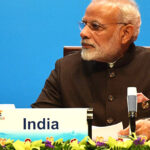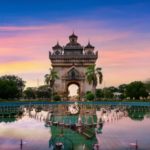
The reconciliation committee proposed by the government isn’t going well. Last week, the Pheu Thai Party decided not to join the reconciliation effort, claiming the structure of the committee was “too biased.” Back in early November, the pro-democracy movement Ratsadon announced that it would not be sending representatives, instead insisting that the proposal was simply a tactic designed to keep Thai Prime Minister Prayut Chan-ocha in power. The effort by former Prime Minister Chuan Leekpai and current House speaker to recruit both pro-democracy protesters and pro-monarchy royalists appears futile—or it is simply for the best.
National reconciliation efforts without the embrace of democratic values are likely to fail.
Prayut forced his way into power, sweeping aside the need for democracy, while promising to promote national unity and close divisions between opposing sides. The “social contract” espoused by the government was neither honest nor transparent in its construction. Army General Chalermchai Sitthisart chaired the panel and held less-than public forums at military barracks across the country, attended by civil servants from the Interior Ministry. Many rightly dismissed the effort as propaganda.

Reconciliation cannot exist until there is equal space in society to express frustrations and concerns. That open space, which includes a free press, allows trust between groups to emerge and helps disseminate views on the reconciliation process.
In Thailand, this has been a habitual problem for past and present authoritarian governments. Prior to the 2010 crackdown on the Red Shirt protests that consumed central Bangkok, the Abhisit government promised reconciliation while at the same time demonizing and dehumanizing Red Shirt supporters, cracking down on media supportive of the UDD, and detained supporters without charge. The current government has been arguably even worse, employing Article 112 (lèse majesté) against 12 of the protest leaders, using the judiciary to intimidate and dissolve opposition parties, and using emergency measures to ban media outlets deemed too critical.
Political reconciliation in Thailand, however unlikely, will not survive without a dramatic transformation of institutions, which contribute to many of the country’s most persistent social, economic, and political ills. There are huge questions that remain unresolved and that would contribute to future political unrest and instability—aside from looming questions about reforms that protesters are calling for.
What would the role of the military be in a reconciled Thailand? What role would existing institutions play in reducing socioeconomic tensions? Reforms to economic institutions are critical to building more equitable relationships between groups, critical in a country that has recently been named the most unequal country in the world. Most importantly, groups are not likely to come to the negotiating table without the addressing the ominous presence of the military.
The military has thwarted previous attempts at reconciliation because of its insistence on leading the process, while oblivious to the fact that it is instrumental in creating deep divisions in Thai society. The junta has advocated the rejection of true democracy in favor of a flawed “Thai-style” democracy, where the military-monarchy alliance maintains order and political freedoms are a distant second. Quite clearly, this alliance has a dim view of both fundamental freedoms and universal human rights. It deems criticism, both domestic and international, as a threat—not as essential free expression.
Past Thai governments, as well as those abroad, provide an abundance of evidence of what not to do. After the crackdown on Red Shirt encampments in Bangkok in May 2010, Abhisit launched his national reconciliation plan to address political, economic and social disparities. He eventually commissioned the Truth for Reconciliation Commission of Thailand (TRCT), as an independent body to determine the root causes of the 2010 political crisis. While the TRCT addressed some major concerns, its recommendations went largely unheeded because trust-building had not occurred between parties. As Yingluck’s administration was swept from power, political persecution of Thaksin-aligned figures once again became commonplace.
Reconciliation in Sri Lanka after the long civil war between the Liberation Tigers of Tamil Eelam (LTTE) and the Sinhalese-dominated Sri Lankan government failed because of a lack of political equality, damaged or politically compromised institutions, and an entrenched regime that ultimately undermined the process. The Mahinda Rajapaksa regime appointed the Lessons Learned and Reconciliation Commission (LLRC) in April 2010, after pressure from the United Nations, to conduct an investigation into the causes of violence. The LLRC failed to win the confidence of Tamils after a relentless campaign of media repression, the dominance of the military in Tamil controlled areas in the North, and the “control democracy” the Sinhalese-dominated government had established over minorities. The implementation of reconciliation in Thailand is just as unlikely without specific conditions necessary for mutual trust—both between individuals and between individuals and institutions.
Thailand’s reconciliation effort is both premature and dogged by multiple challenges. At this early stage, what is needed is not the leadership of past Prime Ministers, but the embrace of democratic values.
The proposed reconciliation panel, which would likely include Senators that are all appointed by the government, is only the first obstacle. Broader questions over the scope of the reconciliation process are even more contentious and will likely deepen political cleavages before they are resolved. Instead, the government should participate in genuine acts of good faith—by dissolving many of the barriers to public trust. It must first end the political oppression of pro-democracy and human rights activists, end intimidation of youth-led protesters via lèse majesté or charges of sedition, and invest in independent, accountable institutions. These are bedrock principles of democracy and should ultimately come first.






